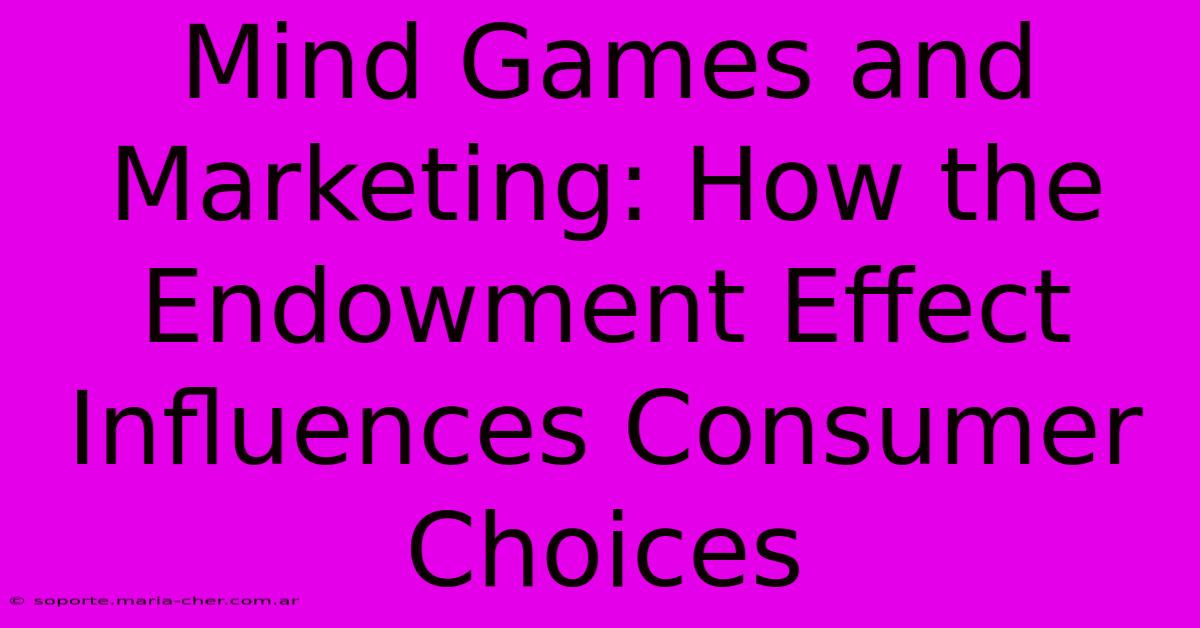Mind Games And Marketing: How The Endowment Effect Influences Consumer Choices

Table of Contents
Mind Games and Marketing: How the Endowment Effect Influences Consumer Choices
The world of marketing is a battlefield of subtle psychological manipulations, and understanding these tactics is crucial for both marketers and consumers. One powerful, often overlooked influence is the endowment effect, a cognitive bias where we place a higher value on things we own, simply because we own them. This seemingly simple bias has profound implications for how consumers make choices, and marketers leverage it to boost sales.
Understanding the Endowment Effect
The endowment effect, also known as the endowment bias, stems from our inherent aversion to loss. Research consistently shows that people demand more to give up an object than they would be willing to pay to acquire it. This isn't necessarily about the object's inherent worth; it's about the emotional attachment and perceived loss associated with relinquishing possession. Think about it: would you pay $50 for a coffee mug? Probably not. But would you sell a coffee mug you already own for $50? The chances are, you'd want more.
This discrepancy highlights the power of ownership in shaping our perception of value. The mere act of possessing something, even briefly, inflates its perceived worth in our minds. This isn't irrational; it's a deeply ingrained psychological mechanism.
Examples of the Endowment Effect in Daily Life
The endowment effect isn't limited to marketing; it's woven into our daily lives. Consider these examples:
- Selling a used car: You might price your used car significantly higher than its market value because it holds sentimental value or you've become accustomed to its features.
- Negotiating a salary: Employees often overvalue their current salary and benefits package, making it harder to negotiate a better offer elsewhere.
- Online shopping returns: The ease of online returns sometimes leads to buyers keeping items they wouldn't have purchased had they not had the opportunity to "try before they buy." The brief period of ownership increases its perceived value.
How Marketers Exploit the Endowment Effect
Savvy marketers are well aware of the endowment effect and employ various strategies to capitalize on it:
1. Free Trials and Samples:
Offering free trials or samples allows consumers to experience the product, creating a sense of ownership. This subtle ownership dramatically increases the likelihood of a purchase. The "loss" of the product after the trial period motivates conversion.
2. Money-Back Guarantees:
Money-back guarantees cleverly reduce the perceived risk of purchase. By minimizing the fear of loss, consumers feel more comfortable making a purchase, further enhancing the endowment effect's influence.
3. Personalized Experiences:
Creating a personalized experience, such as customizing a product or offering bespoke service, fosters a stronger sense of ownership and attachment. The more unique the experience, the greater the perceived value.
4. Limited-Time Offers and Scarcity:
These tactics tap into our fear of missing out (FOMO). The scarcity creates a sense of urgency, accelerating the decision-making process and increasing the perceived value before the opportunity disappears. This amplifies the endowment effect, as consumers fear losing the chance to own the desired item.
The Endowment Effect and Consumer Decision Making
Understanding the endowment effect allows consumers to make more rational purchasing decisions. Recognizing this bias can help you:
- Avoid impulsive buys: Take time to assess the true value of an item, detaching from the feeling of ownership that a free trial or sample might create.
- Negotiate effectively: Be aware of your own emotional attachment to what you already have when negotiating salaries or selling possessions.
- Evaluate marketing tactics critically: Don't let clever marketing strategies manipulate your perceptions of value. Take time to compare prices and features before committing to a purchase.
Conclusion: Navigating the Landscape of Marketing Psychology
The endowment effect is a powerful force shaping consumer behavior. By understanding how this cognitive bias works, both marketers and consumers can navigate the complex landscape of marketing psychology more effectively. For marketers, it's a tool for enhancing sales; for consumers, it's a valuable insight into making more informed and rational purchasing decisions. The key is awareness – understanding this bias can help you make better choices, whatever side of the transaction you're on.

Thank you for visiting our website wich cover about Mind Games And Marketing: How The Endowment Effect Influences Consumer Choices. We hope the information provided has been useful to you. Feel free to contact us if you have any questions or need further assistance. See you next time and dont miss to bookmark.
Featured Posts
-
The All In One Mecca Discover A Site That Has Everything You Ve Ever Desired
Feb 07, 2025
-
Unlock The Secret The Real Cost Of A Breathtaking Bunch Of Baby Breath
Feb 07, 2025
-
Insurance Hack How To Slash Your Urgent Care Bill
Feb 07, 2025
-
Unlock The Secrets Of Your Senses Find The Best Otolaryngologist Near You
Feb 07, 2025
-
Flip The Horns Occult Secrets Behind The Bulls Logos Upside Down Enigma
Feb 07, 2025
